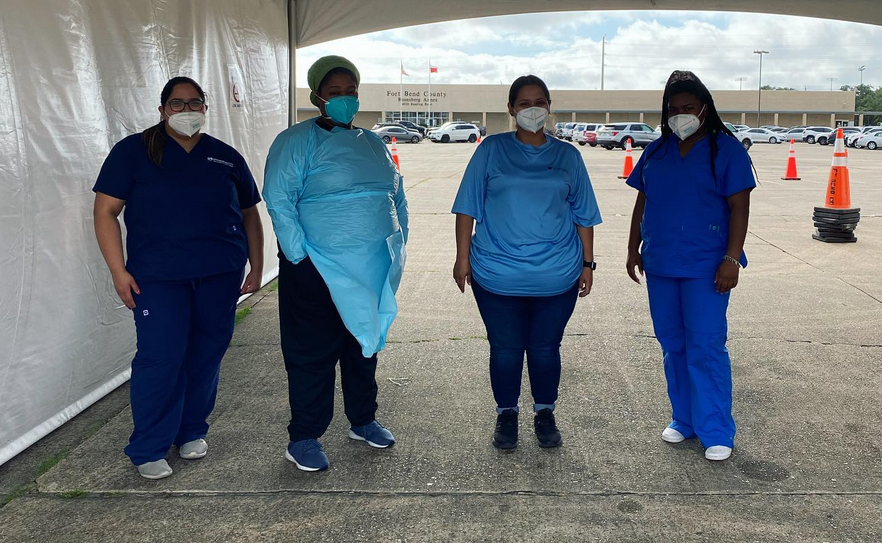
Safety-net clinics across Texas are facing potentially devastating financial struggles during COVID-19, but a new emergency loan program developed by EHF and fiscally sponsored by Austin Community Foundation is helping clinics remain open to serve more Texans at risk of going without medical care during the pandemic.
The $5 million Texas Clinic Emergency Loan Fund offers selected federally qualified health centers (FQHCs) and other charity clinics up to $1 million in low-interest loans to help offset reduced revenues from fewer routine patient visits, shifts to telemedicine, increase in uninsured patients, and other additional expenses caused by COVID-19.

“Many of these community clinics have seen their revenues drop by 60%, while costs for things like telehealth, COVID-19 testing and PPE keep rising,” said Elena Marks, EHF’s president and CEO. “There’s a limit to traditional grants from philanthropy that can help these clinics, but the loan program works as potential ‘recyclable funding’ to keep more clinics up and running to serve low-income families who may need the care now more than ever.”
Six FQHCs that each have multiple clinic sites have secured loans through the Texas Clinic Emergency Loan Fund. These clinics service communities in greater Houston, Austin, and 20 Texas counties. The loans range from $500,000 to $1 million, require no payment in the first year, and have a three-year repayment term.
In addition to lost patient revenue and added costs to deal with COVID-19 protocols, many clinics had to close dental and vision clinics. Others had to temporarily close clinic locations due to staff exposure to COVID-19. Health centers have had to furlough employees or downsize staff. Most of the participating clinics have had to invest in new equipment and technology for telemedicine. Clinics are also seeing dramatic increases in uninsured patients, which has led to millions of dollars in unplanned costs for some of the clinics.
Each of the participating non-profit clinics offer comprehensive primary and mental health care services to all patients, regardless of their ability to pay, and offer a sliding-scale fee program. Together, the participating clinics see more than 280,000 patients each year at almost 100 different locations.
The loan fund is part of EHF’s $20 million Impact Investing Program that was launched in 2019. The program will enable EHF to use other financial tools like debt and equity investments in for-profit and non-profit organizations to advance the same strategies the foundation seeks to achieve through traditional grantmaking. EHF partnered with Austin Community Foundation on the loan fund because of its experience in impact investing in Texas.
“The health and economic consequences of COVID-19 have pressed the philanthropic sector to seek creative solutions that are not bound by the confines of traditional grantmaking,” Mike Nellis, chief executive officer, Austin Community Foundation, said. “By partnering with Episcopal Health Foundation, our organizations are able to provide alternative financial vehicles to meet the needs of community clinics as they navigate operating in a pandemic environment.”
EHF developed the Texas Clinic Emergency Loan Fund and provided the initial funding for the program. Austin Community Foundation serves as the fiscal sponsor and distributes the loans. Avivar Capital serves as the fund’s program administrator, implementing the fund in partnership with national leaders in impact investing, clinic financing and loan administration.
Participating Clinics:
| Clinic | Sites/Locations | Annual Patients Served | Counties Served |
Legacy Community Health | 34 | 127,526 | Harris, Fort Bend, Galveston, Montgomery, Jefferson, Chambers, Liberty, Orange, and Hardin |
| Lone Star Circle of Care | 23 | 92,801 | Bastrop, Bell, Burnet, Harris, Travis, and Williamson |
| AccessHealth | 17 | 21,805 | Fort Bend and Waller. 11 WIC sites: Fort Bend, Waller, Wharton, Austin, and Colorado counties |
| Spring Branch Community Health Center | 6 | 20,089 | Harris/Fort Bend, serving patients from Fort Bend, Waller, and Montgomery counties |
| Avenue 360 Health & Wellness | 9 | 12,089 | Harris and Waller, serving patients from Montgomery, Liberty, Fort Bend, and Brazoria counties |
| Matagorda Episcopal Health Outreach Program (MEHOP) | 8 | 9,703 | Matagorda, Wharton, Brazoria, Jackson, Fort Bend, and Colorado |